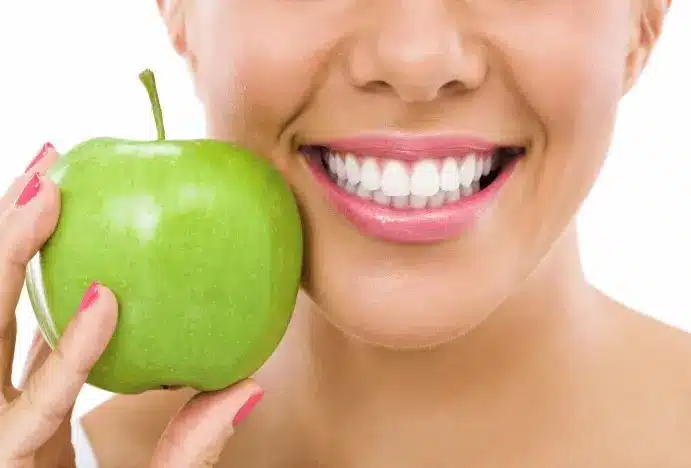What you eat affects more than just your waistline—it has a direct impact on your oral health. From enamel erosion to gum inflammation, your diet plays a central role in shaping the condition of your teeth and gums. If you’re working with a dentist in Trenton to improve your dental health, your eating habits are just as important as your brushing and flossing routines. This article explores the science behind how food interacts with your mouth and offers a practical guide on which foods support a healthy smile and which may harm it over time.
The Science Behind Diet and Dental Health
Every time you eat, you set off a series of biochemical events in your mouth. The bacteria that naturally live in your oral cavity feed on sugars and starches from your food. As they digest these substances, they produce acid as a byproduct. This acid can wear down tooth enamel, the hard outer surface of your teeth, leading to cavities and increased sensitivity.
Saliva acts as a natural buffer, helping neutralize acids and wash away food particles. However, a diet high in sugar or acid can overwhelm this protective system. Over time, this may result in tooth decay, gum disease, and even tooth loss.
Beyond sugar, nutritional deficiencies can also compromise your oral health. A lack of key nutrients like calcium, vitamin D, and vitamin C weakens your teeth and gums, making them more susceptible to infection and disease.
Foods That Strengthen Your Smile
While some foods wreak havoc on your teeth, others actively support dental health. Here are the top categories of tooth-friendly foods:
1. Crunchy Fruits and Vegetables
Foods like apples, carrots, and celery have a high water content and require a lot of chewing. This not only stimulates saliva production but also helps mechanically scrub your teeth clean as you eat.
2. Dairy Products
Milk, cheese, and yogurt are excellent sources of calcium and phosphates, which are essential for maintaining strong enamel. Cheese, in particular, has been shown to neutralize acids in the mouth and increase saliva flow.
3. Leafy Greens
Spinach, kale, and other greens are rich in vitamins and minerals like calcium and folic acid, which support both teeth and gum health.
4. Green and Black Tea
These teas contain polyphenols that help reduce bacteria and inhibit their growth, decreasing the likelihood of cavities and gum disease. Just be mindful of staining.
5. Water
It may sound basic, but water is one of the best beverages for your teeth. It helps rinse away food debris and maintains optimal saliva levels, particularly when fluoridated.
Foods and Drinks to Limit or Avoid
Some foods and drinks are particularly damaging to your teeth and gums. While you don’t need to cut them out entirely, consuming them in moderation and practicing good oral hygiene afterward is crucial.
1. Sugary Snacks and Sweets
Candies, cookies, and other sugary treats feed the harmful bacteria in your mouth, accelerating acid production. Sticky candies like caramels and gummies are especially problematic because they cling to the teeth.
2. Soda and Sugary Beverages
Regular and diet sodas are acidic and can erode enamel. Energy drinks and sweetened teas also fall into this category. Try limiting these and drinking through a straw to reduce contact with your teeth.
3. Citrus Fruits
While oranges, lemons, and grapefruits are rich in vitamin C, they’re also highly acidic. Frequent exposure to citric acid can wear down enamel and increase sensitivity.
4. Starchy Foods
Chips, bread, and pasta can break down into simple sugars in the mouth. These particles often get stuck between the teeth and can feed bacteria for hours.
5. Alcohol
Alcohol dries out the mouth, reducing saliva flow and making it easier for bacteria and plaque to build up. Red wine can also stain teeth.
Timing and Habits Matter
It’s not just what you eat, but how and when you eat that influences your oral health. Snacking frequently throughout the day gives bacteria more opportunities to produce acid. Instead, try to eat meals at regular intervals and drink water between meals to keep your mouth clean.
Brushing immediately after eating acidic foods can actually cause more harm than good. The acid softens enamel, and brushing too soon can wear it away. Wait at least 30 minutes before brushing.
Chewing sugar-free gum after meals can stimulate saliva production and help clean the mouth if brushing isn’t an option.
Building an Oral-Healthy Diet
Creating a diet that supports your dental health doesn’t mean giving up all your favorite foods. The goal is to be mindful of your choices and maintain balance. Here are a few tips:
- Combine acidic foods with alkaline ones (like pairing fruit with cheese) to reduce the impact on your teeth.
- Rinse your mouth with water after eating or drinking something sugary or acidic.
- Choose whole, unprocessed foods when possible. They often require more chewing, which benefits saliva production.
- Read labels. Sugar can hide under many names like sucrose, high-fructose corn syrup, and dextrose.
A registered dietitian or your dentist in Trenton can provide personalized recommendations based on your health needs and dietary preferences.
Conclusion
Your diet is one of the most powerful tools you have for protecting your teeth. By understanding how different foods and habits affect your oral health, you can make informed decisions that benefit your smile in the long term. Embrace crunchy fruits, dairy, and leafy greens, and moderate your intake of sugar, acid, and alcohol. Small, consistent choices lead to big results—not just for your body, but for your teeth too.
Also Read-Longevity Supplements: Enhancing Healthspan and Lifespan through Science










